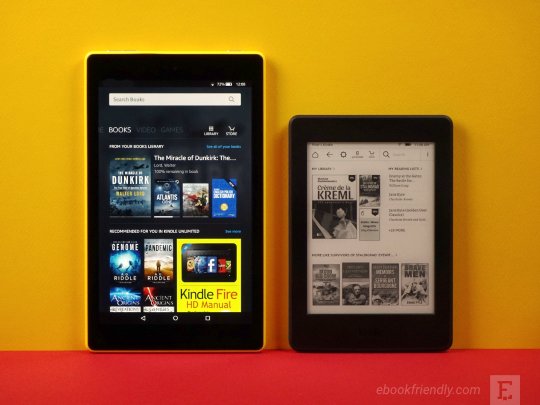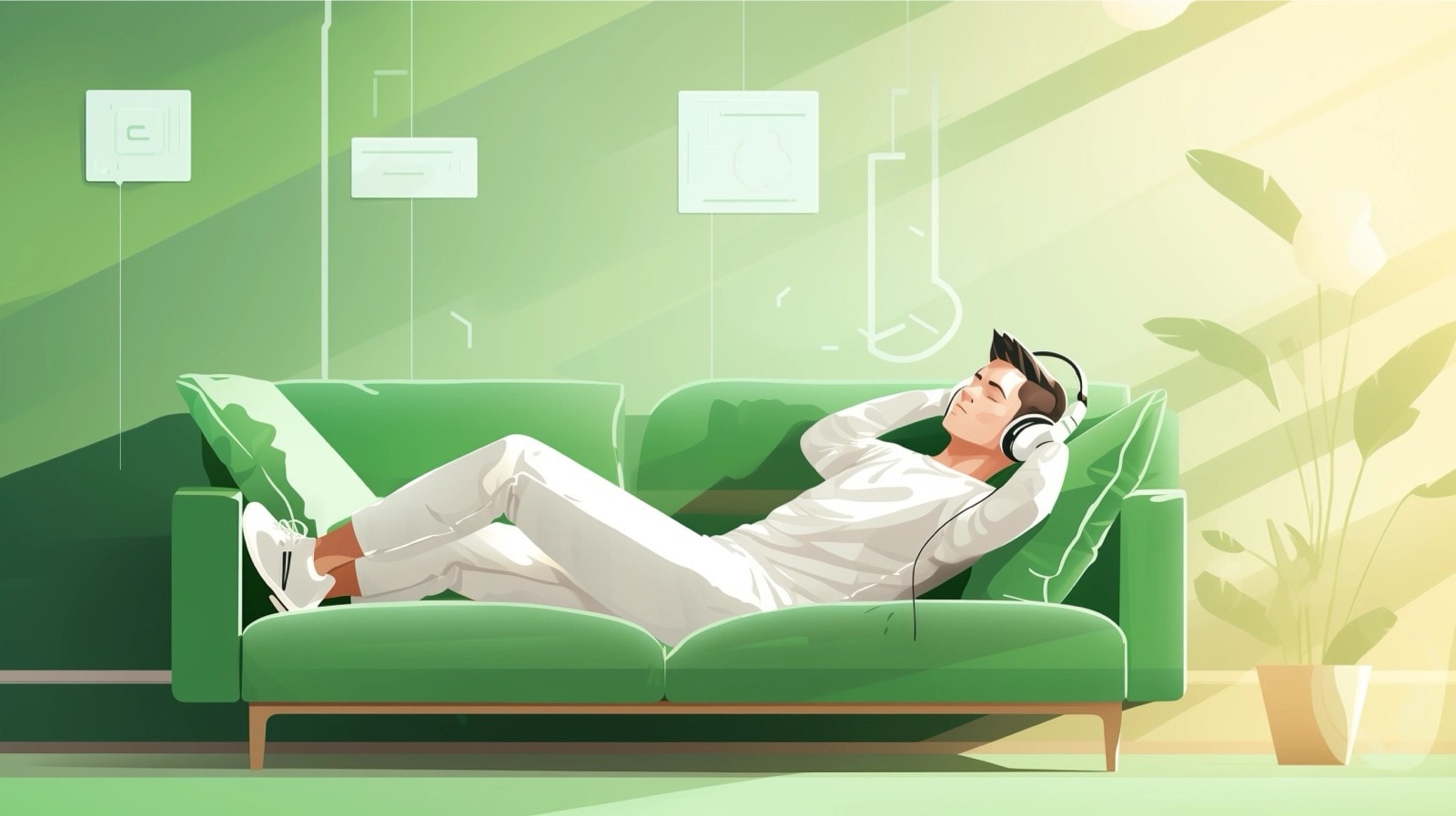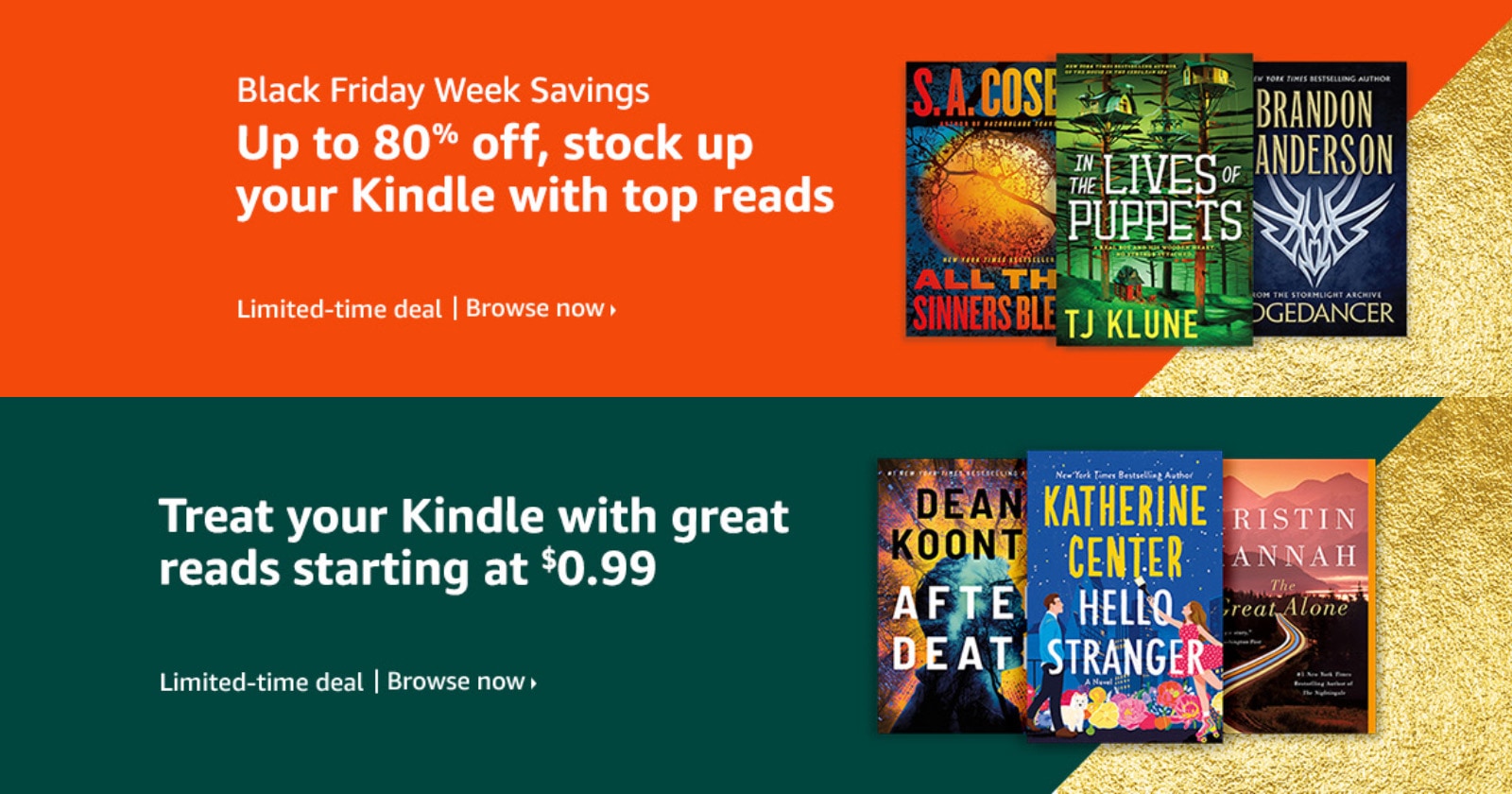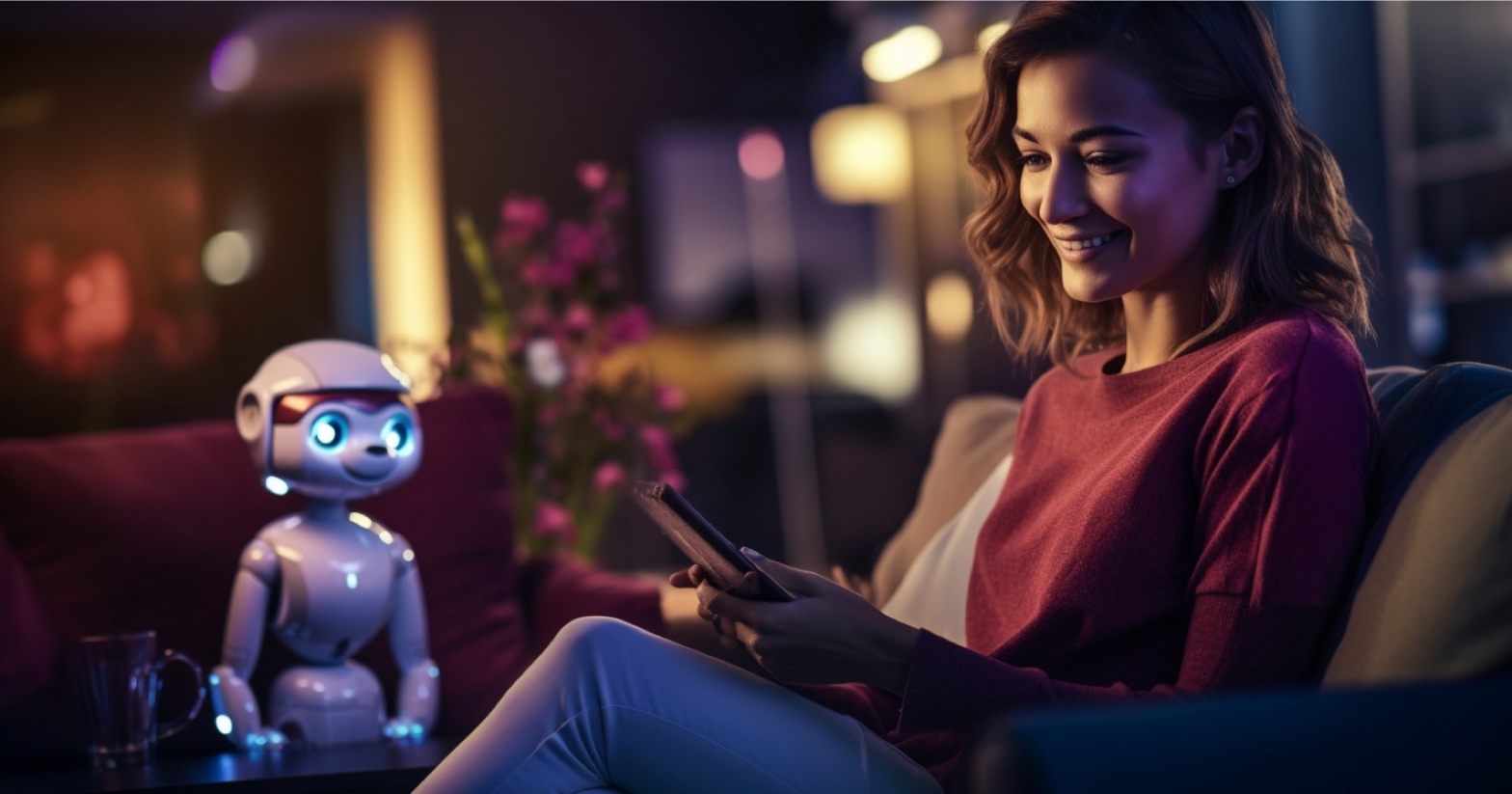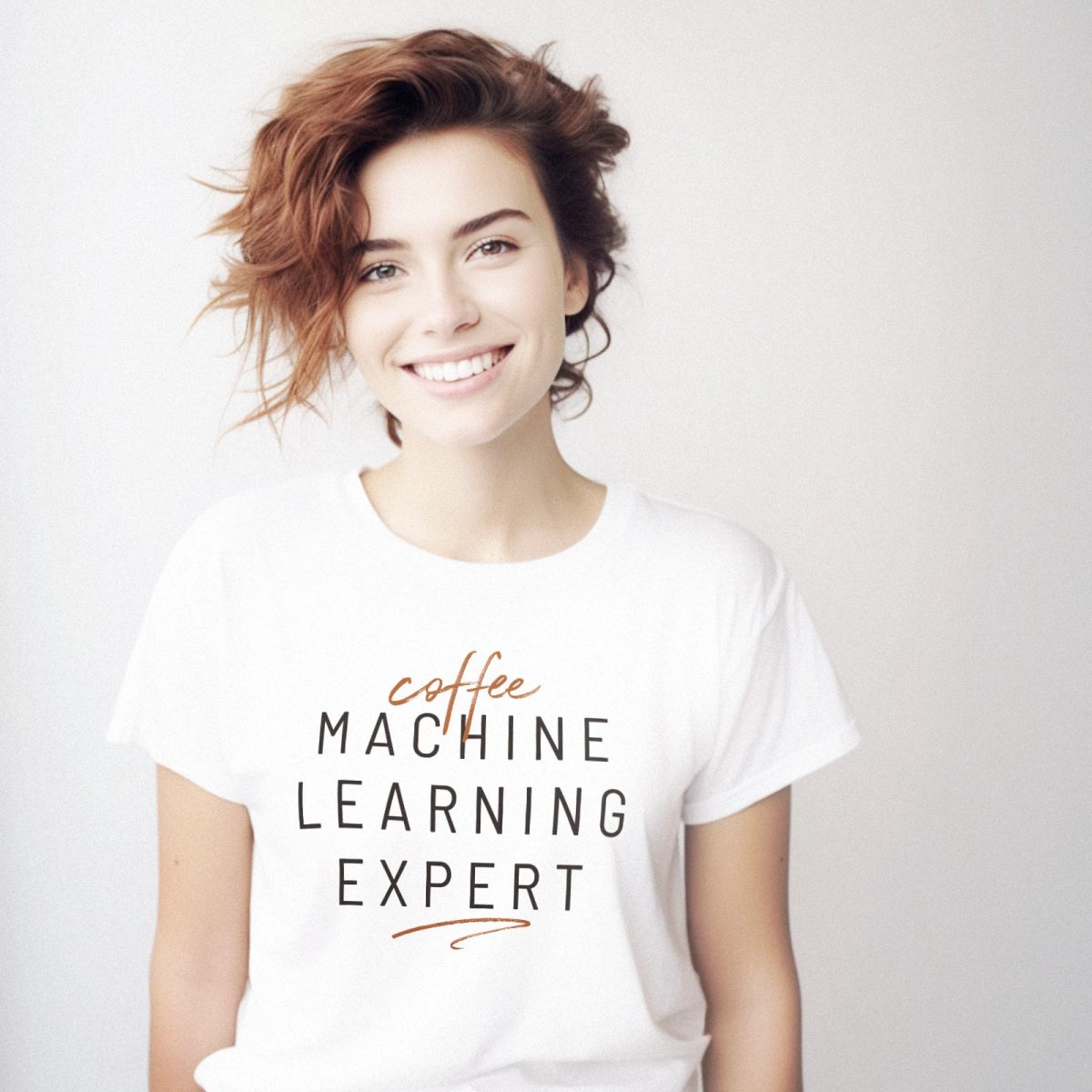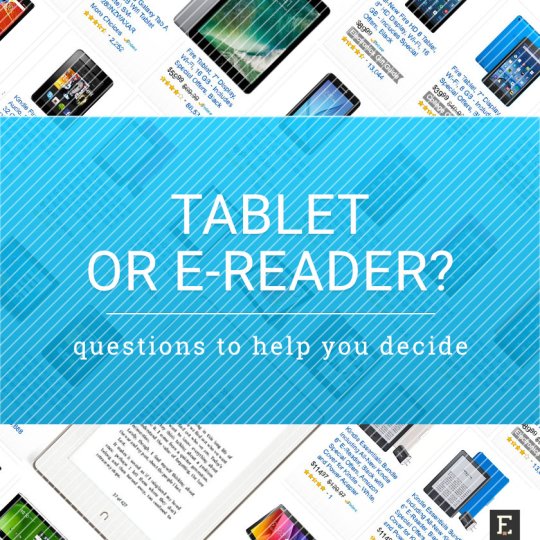
The prices of e-readers are constantly going down. Most popular models, Kindle from Amazon and Nook from Barnes & Noble, cost below $100.
[ef-archive number=2 tag=”lists” ]
Many users feel that this is a fair price for a device that lets read and manage electronic books.
On the other side, e-readers are single-purpose devices. Some of them offer extra features like web browsing, but you should be really careful about it. E-readers have technical limitations (like e-paper screen), and they are not meant to give anything more than a sheer pleasure of reading.
Tablets are usually more expensive than e-readers, but they are also more versatile. You can use them for other purposes, such as emails, social media, web browsing, video, or games. They will also let you read ebooks that are enhanced with images, videos, or interactive elements.
Usually, when someone is looking for a device, first thing she or he does is to find out what tech reviewers think.
Well, my advice is: don’t rely on experts. They will only tell you whether the new generation Kobo is a 3 or 5-star e-reader, but they won’t help you recognize your own e-reading preferences.
Answer the questions below, and you may realize that the decision on what is better – tablet or e-reader – came easier than you’d thought.
[ef-reco id=”89031″ title=”Read also” info=”Top article”]
Tablet or e-reader – which is better?
1. How often do I read books?
A. Regularly
B. Occasionally
2. Is reading in color important for me?
A. No
B. Yes
3. What kind of books do I mostly read?
A. Text-only (fiction)
B. Text with pictures and/or graphics (guides, cookbooks, textbooks)
4. Do I want to read enhanced ebooks?
A. No
B. Yes
5. How long am I reading a book non-stop?
A. More than an hour
B. Less than an hour
6. Am I concerned about the eye strain LCD screens cause?
A. Yes
B. No
7. Will the device be used by other members of my family?
A. No
B. Yes
8. Will I use this device to read books to my children?
A. No
B. Yes
9. Do I want to have constant access to the web?
A. No
B. Yes
10. Do I expect the device to help me focus on reading?
A. Yes
B. No
11. What other functions do I want to have?
A. Music, text-to-speech
B. Music, text-to-speech, videos, games, internet, mail
12. Do I want to have easy access to different ebookstores?
A. No, one ebookstore is enough
B. Yes, I want to download/buy ebooks from different sources
Tablet or e-reader – results
If you’ve chosen answer “A” more than 6 times, you’ll feel better with an e-reader. It’s a great device to help you focus on reading for long hours.
More than 6 picks for “B” means, that you will prefer a tablet. It’s a versatile device with a full multimedia support, which can be used by all members of your family for different purposes.
Tablet or e-reader – tips and rationale
Question 1
If you have checked answer “A”, that means buying an e-reader is a fully justified decision.
The most popular rationale for buying a dedicated e-reading device is trying to calculate how many books one reads per year and how much can be saved by buying an ebook version instead of print.
I think that you don’t really have to cross the line, let’s say to save $80 on ebooks, to compensate the cost of the e-reader. What is really important is that the device will be used heavily.
Question 2
The most common differentiation between e-readers and tablets is the display they have.
E-readers have e-paper screen that doesn’t need a backlight to produce a visible image. Black-and-white is the standard for e-paper, usually with 16 levels of gray.
There are already color e-readers on the market, but they will never be as good as tablets with LCD screens. Color is a part of another world, where action rules. E-paper screens are not meant for active usage – their refresh rate is too low.
Question 3
Because of a fact that e-paper is black-and-white, and playing interactive elements is impossible, e-readers are ideal mostly for fiction.
Non-fiction titles, cookbooks, travel books, or textbooks – where you will most probably work with text, and not only read it (note-taking, bookmarks, highlights) – are better suited for tablets.
Question 4
For me, a better distinction between an e-reader and tablet is a support of enhanced ebooks.
In enhanced ebooks, you can find audio and video files embedded. You can play animations, or use, sometimes very advanced, interactive elements, like maps or charts.
E-readers don’t support enhanced ebooks, tablets do.
What’s more important, with tablets you can access many ebooks that are sold as separate book applications, naming only an already iconic Alice for the iPad.
Question 5
This question may look irrelevant, but in times of the web and social media, the point is to define how distracted you are and how much focused on the text you want to be.
If you read for long hours, and if you want to totally forget about the outside world, choose an e-reader. This comes very close with a next question.
Question 6
Eye strain is a serious problem. Many people’s job is about using computers. Staring for 8 hours a day at an LCD screen is not good for the eyes and may cause eye strain. It’s because LCD screens produce the image by using a light source placed behind. In other words, you are looking into the source of light.
If it doesn’t bother you to use the same kind of screen in a device that is mostly devoted to reading, you can choose a tablet.
Now, go back to question 5 for a moment: if you want to read for long hours, being not exposed to back light is a better idea. Choose an e-reader, instead.
Question 7
This is a very important question. Mobile devices are a family decision, not personal one any more. Family members, even if they all need a device to read, may want to consume ebooks in different forms.
Tablets are better suited to serve different needs. You can download to them several e-reading applications. This might be a way to separate personal ebook libraries.
An e-reader, on the contrary, is usually connected with a single account from an associated ebookstore. That means all family members would have access to the same library. Sometimes it’s good, but sometimes not.
Question 8
A tablet is the only choice if you want to read ebooks to your kids. It doesn’t only let enjoy full-color books but opens a whole new world of interactive children’s books.
Question 9
Some people want to escape with a book. Other people simply can’t afford it.
If you need to have a constant access to social media, or if you are reading a non-fiction book and want to have a deeper reference from the web, or if you simply write down notes at the time of reading, you should go for a tablet.
Obviously, at the basic level, it’s a question of how a device connects to the web. The standard is a Wi-Fi, for both tablets and e-readers. But equally important is how easy it is to use the web. It’s not easy on an e-reader.
Question 10
This is related to question 5. You need to focus if you want to read for long hours.
Tablets offer a lot of features, sometimes way too many. For a book lover, this may create too many distractions. Push notifications coming all the time when what you most want is to fully escape with a book.
In fact, with tablets, there is no real chance to get offline and focus on reading.
Question 11
You can start learning your own preferences from a basic need: I want to a device to read.
Now, start from that point and try to think what other features you’d like to have in a device. You’ll realize at some point that an e-reader is not enough.
Question 12
As I already wrote in explanation of question 7, family members would want to have access to different sources of ebooks.
When you choose a tablet, you will be able to install e-reading applications from competing ebookstores: Kindle, Nook, Kobo. It’s also possible on an e-reader, but it needs an extra effort in turning all ebooks you own to the DRM-free file that is supported by your e-reader.
• • •
I hope the questionnaire helped you get closer to a final decision on which device will fit your needs better. Please let me know what do you think about the questionnaire and how could we improve it.
Below, you’ll find popular e-reader and tablets brands, to dig deeper into the topic.
Popular e-readers
Kindle – you must have heard of it, as this is the most popular e-reader brand in the world. Offered by Amazon, the Kindle range includes the basic Kindle, the front-lighted Kindle Paperwhite, and the high-end Kindle Voyage.
Nook – if you are a Barnes & Noble customer, you may want to check out Nook. On B&N website, you’ll have a chance to see the Nook GlowLight, the stylish and original e-reader with the glowing screen to let you read in the dark.
Kobo – a third major company that offers popular e-readers is Kobo. The devices on offer are Kobo Touch 2.0 (the basic model), Glo HD (the model with the high-definition screen that is lighted), and a waterproof Aura H20.
Popular tablets
Fire – Amazon also offers a wide range of tablets, from affordable models, such as the 2015 model Fire 7 that costs $49, to premium HDX devices.
Samsung Galaxy Tab – under this name the largest number or different tablets is being sold. You can pick up an affordable Galaxy Tab A, or a high-end Galaxy Tab S2.
iPad – if you can afford a product from Apple, you’ve been most probably thinking already about the iPad. But you don’t have to buy iPad Air. There is also a smaller iPad Mini to consider.
• • •
To get more posts like this, please subscribe by RSS or email. Let’s also connect on Facebook, Twitter, and Pinterest.
Check also other posts recently published on Ebook Friendly:
[ef-archive number=5 tag=”lists” ]

